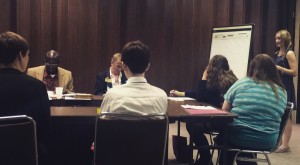Presents info on sanitation and water quality in China
 Greene County High School senior Noelle Gray (pictured, standing) participated in the World Food Prize Iowa Youth Institute at Iowa State University Monday, April 27.
Greene County High School senior Noelle Gray (pictured, standing) participated in the World Food Prize Iowa Youth Institute at Iowa State University Monday, April 27.
The institute brought together more than 250 high school students from 123 different high schools across Iowa to explore critical global issues and academic and career paths in STEM fields. The Iowa Youth Institute has been referred to as the most significant event to inspire Iowa high school students to focus on the global issues in STEM.
Each participating high school student wrote a research paper on a key issue that impacts hunger in another a country, such as water scarcity or gender inequality. The students propose their own solutions in small-group roundtable discussions facilitated by academic and industry experts, and students and teachers also participate in hands-on immersion activities in research facilities and labs at Iowa State University.
Gray was selected to participate based on a research paper she wrote (with assistance from vocational ag teacher Cortney Schmidt) that focused on sanitation and water quality in China.
Governor Terry Branstad provided the afternoon keynote to the students and business leaders from across the state. Branstad said, “In doing this together, we will keep Iowa at the forefront of science and agriculture and food production and uphold our state’s great legacy in feeding the world.”
Honored guests at the event included Congressman David Young, State Senator Rita Hart, Representative Abby Finkenauer, ISU president Steven Leath, and former US Ambassador to Latvia Charles Larson. Students were able to interact and learn from these professionals during the luncheon.
Dr Norman Borlaug, Iowa’s great hero who is now enshrined in the U.S. Capitol for his great agricultural and humanitarian achievements, founded the World Food Prize and also envisioned this and other World Food Prize youth programs as the way to inspire the next generation of scientists and humanitarians to go into critical fields and to help solve the challenge ahead: Feeding the 9 billion people who will be on our planet by the year 2050.
“These programs connect real-world issues and challenges that need solved to actual academic pathways and research that’s going on right here in the state of Iowa,” said Amb. Kenneth M. Quinn, president of The World Food Prize Foundation. “Our goal is to enthuse high school students about the huge realm of possibilities out there, and to dream big when it comes to choosing their future paths.”
The impact of this event has a lasting effect that goes past the day itself. Ninety-two percent of students that participate in the World Food Prize Youth Programs go on to pursue degrees in science and agriculture, while 77 percent of students chose a career field related to agriculture, food, science, or food security.
“For students who attended the institute, this is one of their first experiences facing food security issues. The Iowa Youth Institute combines the students’ passion for service with their interest in STEM, leaving a lasting impression on how they can make a positive difference in the lives of others in their future careers,” said Jacob Hunter, director of Iowa education at the World Food Prize.
More information is available at www.worldfoodprize.org/iowayouth.
